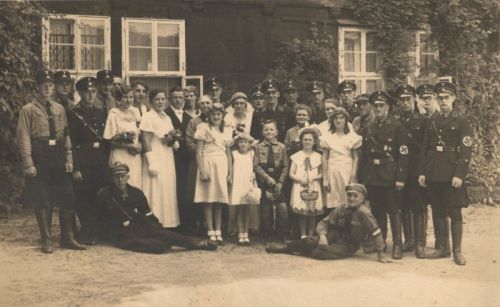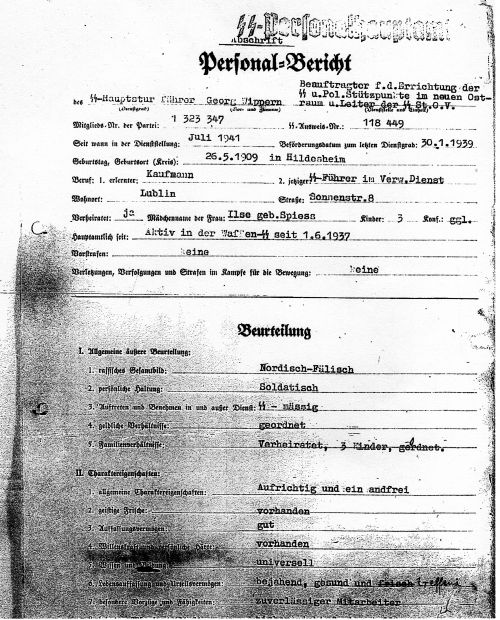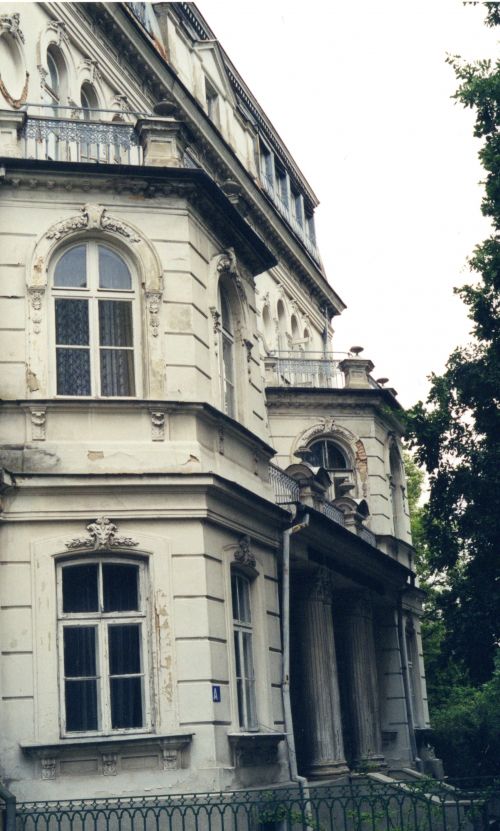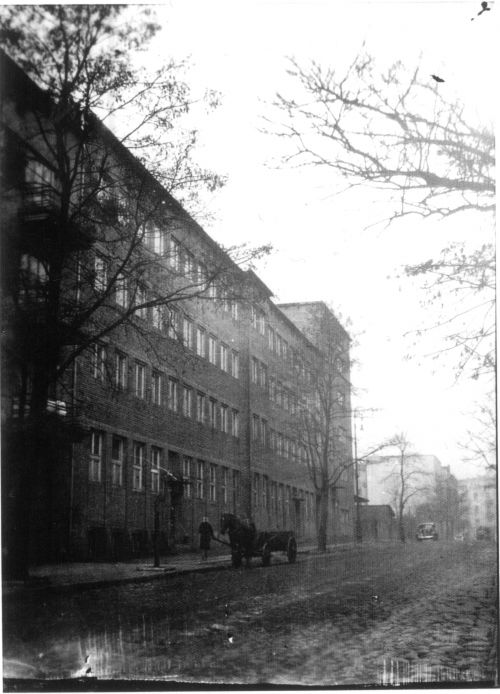Georg Wippern

Georg Wippern standing next to his bride at their wedding in 1933 (Private Archive)

Georg Wippern - Extract from personal file (NARA, Washington DC)
Georg Wippern was born on May 26, 1909, in Neuhof bei Hildesheim. In wartime Lublin he was in charge of the processing and forwarding of valuables and currency to Berlin, and also to Krakow. Wippern for some time extremely close to Odilo Globocnik, the SS and Police Leader for the Lublin district. He was in charge of smelting precious metal artifacts and the tallying of currency, bullion and other valuables, including gems, pearls, and diamonds, taken from the Jewish victims, murdered at the death camps.
His sorting and processing unit was known as Abteilung Reinhardt and Abteilung IVa. Assigned to Wippern were SS-Unterscharfuhrer's Eicholz and Dorl. Although they worked at different times, they had assigned to them between 20 and 30 Jews who were involved in sorting and storing the high value possessions recovered from the Jews who were murdered as part of Aktion Reinhardt.
Wippern was directly responsible to SS-Obergruppenfuhrer Oswald Pohl in Berlin. He also had assigned to him experienced banking personnel, SS-Obersturmfuhrer Huber, SS-Oberscharfuhrer's Johannes Teichelmann and Alois Rzepa, and an SS-Unterscharfuhrer Pflanzer, because the sorting and classifying work had simply overwhelmed his staff. They were responsible for registering all the valuables and their storage in a specially built steel strong room from where much of the loot was moved by truck to the SS-WVHA in Berlin, after which it was transferred to the Reichsbank. Wippern's office was based in the SS-Standortverwaltung which was at Chmielna 1. A large five-storey building at Chopin Street 27, near the centre of Lublin, was where items were sorted, cleaned and stored on huge shelves by 20 Jews brought from nearby Jewish Labour Camp at Lipowa Street 7.

Lublin - Former SS -Standortverwaltung - 2002 (Chris Webb Private Archive)
Georg Wippern's first post-war court statement outlined his duties in Lublin, and how he came to be appointed to this role:
'As I have already stated at an earlier examination especially by the public prosecutor of Hamburg, I as a Sturmbannfuhrer was leader of the SS-Garrison administration in Lublin. In this capacity it was my duty to be responsible for the Waffen-SS units in the Lublin Distrikt, generally speaking, for the troop administration as well as caring for troop units passing through, articles of clothing, board and lodging payment. I was under the authority of the Wirtschafstverwaltungshauptamt of the Waffen-SS in Berlin, headed by Oswald Pohl.
In 1942, the exact time I cannot give, the so-called housekeeper administrator in Krakow was switched from SS-Standartenfuhrer Schellin. Furthermore, I reported to the SS and Police Leader Globocnik, because tasks were added, as for example, the Settlers Economic Community in Zamosc and one of the Reichsfuhrer's representatives for establishing SS and Police Strongpoints in the New Eastern Territory, which was headed by Globocnik. Furthermore, I was made responsible for the administration of various business firms in the Lublin Distrikt. In all those establishments I only had administrative functions.'
Georg Wippern was visited by Hans Frank, General-Governor in hospital in Lublin during Frank's visit to the city during May 1942. Wippern had been wounded in an ambush, whether this attack was carried out on Odilo Globocnik, is unclear. Georg Wippern gave another statement in court how he became to be the SS-Lublin based 'Keeper of the Vault,' and the process by which the money and valuables were sent mainly to Berlin, and some to Krakow:
'In this context I want to mention that in the beginning I had nothing to do with jewelry and valuables, but then i was asked to come to Pohl in Berlin, who from then on put me in charge for the registration and delivery of valuables and jewelry. On this occasion I learned that they were Jewish property. Because of that I wanted to refuse handling this task, but finally in a fierce battle of words was referred by Pohl to the Brunning Emergency Decree from the year 1932. According to the Heinrich Brunning Emergency Decree where there was given an order that non-registered foreign currency and precious metals were due for confiscation, enforcement of this law was an obligation of the Reich's finance authorities.
At this meeting I heard for the first time the name Wirth. Because Wirth initially delivered the confiscated jewelry and valuables in a disorderly condition at the Reichsbank in Berlin, now this work should be done by me, nothing but as a purely administration specialist. In this context I refer to the statements which I made at the Public Prosecutors Office in Hamburg. According to this Wirth was obliged to deliver the valuables to me. This way I came to know Wirth. I want to emphasize that those jewels and valuables delivered to me, not only came from extermination camps but also from SS and Police Leaders in Warsaw and other places.'
However, Wippern was keen to distance himself from the Aktion Reinhardt mass murder programme and he testified as much:
'Furthermore, I remember that I had repeatedly participated at meetings at the office of SS and Police Leader -Odilo Globocnik. I remember for sure that Wirth had also attended those meetings several times. There were, at times, office leader conferences, where all office leaders of SS and police took part. The subjects of the official conference topic discussions I do not remember in particular, but mostly they dealt with general garrison or security measures.
Special topics were always discussed in closed circles, because they were subject to official secrecy and also could not be of interest to other departments. I can say here with certainty that at the department leader meetings, where I was present, questions regarding Aktion Reinhardt were not dealt with. That applies especially to internal matters.'
However, despite the efforts of Georg Wippern, to distance himself from the actual killings, there is this post-war testimony from Ernst Brosig, another member of Wippern's staff who was which destroys this stance:
'On the other hand I was once in the Belzec camp. That was in July /August 1942. Wippern was in Zamosc and wondered if I could break free for a trip to Belzec.I have no recollection of whether he said the purpose of the trip. I actually went to Belzec with him. A subordinate from the Lublin office was also there.
I don't know what Wippern then had to do in Belzec. I just remember that we were given permission to enter the camp. I then have the memory of a terrible stench of corpses. I realise that there was a building in the camp with chambers. I thought that was the gas chambers. I have a dim recollection of seeing corpses in the distance.I still remember that there were several Jews who handled gold items. Who was with us when we walked through the camp, I really don't remember. When we drove away, I remember we were given a sack. What was in this sack I cannot say for the best of me.'
It can be safely assumed that the purpose of this journey to Belzec, was to take delivery of a sealed sack of banknotes.
Albert Franke-Gricksch produced a detailed report of a Duty Journey through Poland, undertaken by his superior Max von Herff, and himself during May 4th -16th 1943. This extract takes place on Wednesday May 12th, 1943:

Lublin - Chopin Street 27 - Wartime Photograph (Chris Webb Private Archive)
'From Trawniki we traveled back to Lublin to inspect the special enterprise Reinhard. This branch has had the task of realising all mobile Jewish property in the Gouvernement Poland. It is astonishing what immense fortunes the Jews have collected in their ghetto and even ragged and vermin infested dirty little Jews who look like beggars, carry with them, when you strip their clothes off them, foreign currency, pieces of gold, diamonds and other valuables. We wandered through the cellars of this "special enterprise" and we were reminded of the fairy tales of the " Arabian Nights".
Whole boxes full of genuine pearls, cases full of diamonds, a basket full of pieces of gold and many cwts of silver coins, beside jewellery of every kind. In order to carry out a better realisation of all these valuables, the gold and silver are melted into bars. We inspected the melting process in the garden of the house. There is a small foundry where gold and silver are melted and then formed into bars and then delivered to the German National Bank on certain days. "Special enterprise" Reinhard has so far delivered 2,500 kilos of gold, 20,000 kilos of silver and six and a half kilos of platinum, 60,000 Reichsmarks in currency, 800,000 dollars in money and 144,000 dollars in gold. The huge quantity of diamonds and pearls can hardly be evaluated.
The best proof of the of the repercussion this enterprise has on the international market is the quotations on the Swiss Stock Exchange and the effects on the international market in diamonds and brilliants. The prices have all gone down and Switzerland could not absorb any more diamonds, because our enterprise has swamped the market.
In this respect alone, the "special enterprise" Reinhard gives us the means for our political struggle and would have a decisive effect on the world market. Apart from other valuables there are 60,000 watches, most of them double –cased watches of high value, very often decorated with diamonds, 800,000 wrist watches and a huge quantity of other small valuables from tobacco and cigarette cases and gold fountain pens and silver bracelets etc.
In special workshops all these treasures are sorted out and examined by specially trained Jews, jewelers, bank clerks and goldsmiths. If necessary the diamonds are broken out in order to separate them and use the metal in a different way.
The wrist watches will be repaired, if necessary and will be handed out to front-line troops.
When one goes through the cellar of this special branch it appears like a secret treasure and you get a very different idea of all the things for which people have sacrificed their lives and forgotten, through them the real issues. You get the right distance from these false values and, even if our eye is delighted by the shine of thousands of brilliants, some of them the size of a pea, for which the old world has paid hundreds of thousands, one recognises a people which saw its whole existence in the heaping up of such treasures.
It is a pleasure to see with what indifference the Oberscharfuhrer registers these valuables as if they were bits of coal or other things of everyday life. The real values of our life which carry us as human beings and as a nation become very clear and more precious still. The treasure of these people of parasites prove that the age of the power of gold is over and a new time, which has new values, has begun.'
After the Second World War ended Georg Wippern was a customs inspector in Saarbrucken. Together with his family, Wippern moved home frequently, living in a number of different locations such as Saarbrucken, Hannover, Aachen, Bad Durrheim, Homburg and Bonn. German investigators questioned Georg Wippern after the war, but no proceedings were commenced, thus he was never brought to trial. Georg Wippern died on April 26, 1993.
Sources
J. Poprzeczny, Hitler's Man in the East – Odilo Globocnik, McFarland, Jefferson 2004
National Archives Kew WO 309/374
Ernst Brosig Statement - Holocaust Historical Society Archives
Photographs - Chris Webb Private Archive, Stephanie Phillippi Private Archive
Document - NARA Washington DC
Thanks to Mike Tregenza and Robert Kuwalek
© Holocaust Historical Society June 20, 2023

